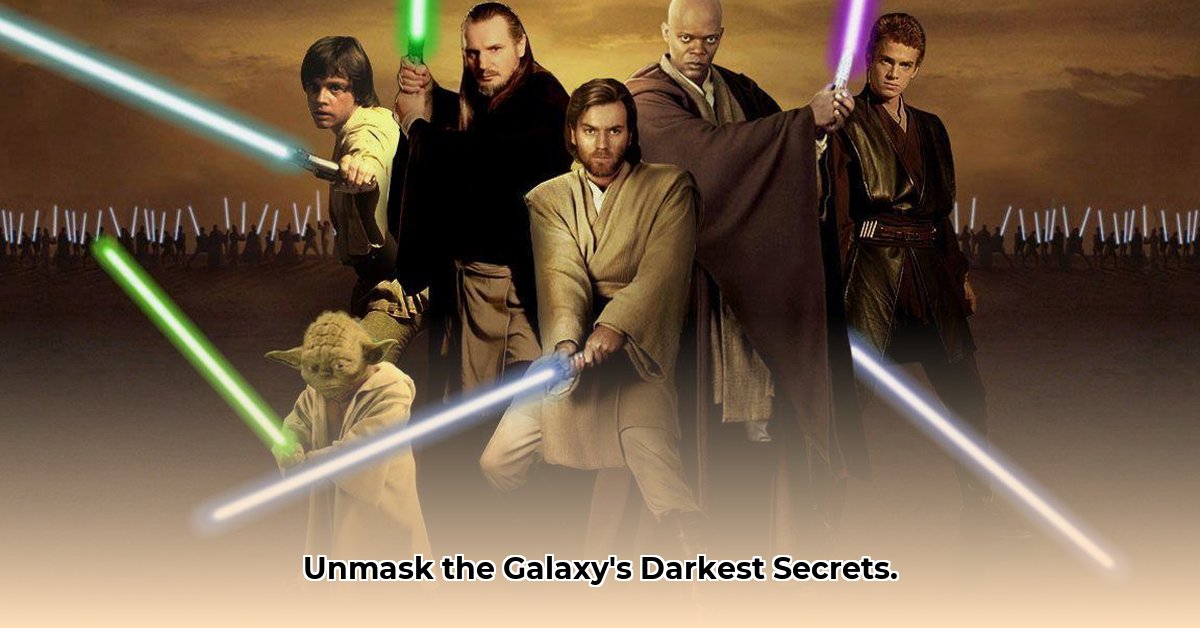
Jedi Foes: A Galaxy Far, Far Away from Good
Eish, Star Wars fans! Ever wondered what makes those skelm (villains) so memorable? It's not just about the pew-pew of lasers and lightsabers, nê (is it)? It's something deeper. This isn't just a list of names; it's a journey into the hearts and minds (and sometimes, just the raw power) of some of cinema's most iconic villains. We'll explore what drives them, how they fit into the bigger Star Wars story, and why they resonate so deeply with us. Let's gaan (go)!
The Fallen: Once Knights, Now Shadows
- Darth Vader: Ai, Vader! The ultimate gevallen (fallen) Jedi. His iconic status isn't just about that breathing mask and imposing figure; it's about the tragedy. Once Anakin Skywalker, a chosen one, fear, loss, and the allure of ultimate power led him astray. His story is a core part of the Star Wars saga – a powerful reminder that even the most heroic can fall. He embodies the corrupting influence of power, but also the possibility of redemption, a classic struggle that resonates with us all. Isn't his story a powerful reflection of our own fears about the slippery slope of ambition?
- Count Dooku: Unlike Vader's fiery rage, Dooku was all calculated elegance. This former Jedi Master felt disillusioned by the Republic, believing it corrupt. He wasn't just a mindless boef (villain); he had a point, or so he made you believe. His story subtly reminds us that even seemingly noble goals can be pursued through morally questionable methods. He shows that villainy can stem from idealistic (albeit misguided) principles, adding complexity to the good vs. evil narrative. How many times have we seen seemingly "good" intentions pave the way for dreadful outcomes?
- Kylo Ren: A modern take on the fallen Jedi. As a descendant of Darth Vader, he's got a legacy to live up to (or down to!). He's conflicted, tormented, and deeply human – he makes mistakes, shows vulnerability, and even doubts himself. This relatability makes him a more compelling adversary. He grapples with internal struggles, reflecting the ongoing battle between good and evil within us all. Does his internal conflict not mirror the anxieties many feel about living up to expectations?
Masters of Manipulation: Pulling the Strings from the Shadows
- Emperor Palpatine (Darth Sidious): The ultimate puppet master. He didn't need a lightsaber; his weapon was manipulation. He subtly guided Anakin Skywalker to the dark side, proving that sometimes, the greatest threat isn't brute force, but subtle influence. He's pure evil, a chilling reminder of how easily manipulation can corrupt even the purest souls. His reign of terror highlights the dangers of unchecked power. Doesn't his manipulative nature mirror our societal anxieties around political manipulation and misinformation?
- Darth Maul: Horns, a double-bladed lightsaber, and a terrifying presence. Maul was raw power and unwavering loyalty to Palpatine. His intensity and fighting skills make him unforgettable. While his motivations may seem simpler (pure power?), his unwavering devotion to a dark cause is significant. Did he want power, or was loyalty to Sidious his true drive? It's a question that makes him uniquely fascinating. Isn't his blind loyalty a reflection of our concerns about extremist ideologies?
Agents of Chaos: Disrupting the Galaxy's Balance
- Grand Admiral Thrawn: This guy was all strategy and brains. A military mastermind, Thrawn's approach was less about lightsaber duels and more about outsmarting his opponents. He's proof that evil doesn't always wear a dark cloak. Sometimes, it's a cold, calculating strategist who prioritizes intellect over raw power. Doesn't his strategic brilliance highlight our fears of sophisticated enemies and strategic threats?
- The Inquisitors: The Empire's Jedi hunters, relentlessly pursuing any remaining Jedi after Order 66. They symbolized the Empire's power and ruthless efficiency in wiping out resistance. Their collective strength demonstrates the Empire's reach and systematic oppression. They highlight how the destruction of an institution isn't just brute force, but a calculated eradication of opposing ideologies. Think about the systematic nature of oppression; the Inquisitors embody that fear.
More Than Just Boewe: The Deeper Meaning
These Jedi foes aren't just villains; they're complex characters adding layers of meaning to the Star Wars universe. They represent different facets of conflict, the temptations of power, and the battle between good and evil. They're reflections of our societal anxieties and internal struggles. Understanding them gives us a richer appreciation of Star Wars, and maybe even some insight into ourselves. Lekker! (Nice!)